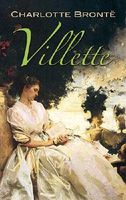 Villette (1853) by Charlotte Bront is the story
of Englishwoman Lucy Snowe who ends up a teacher at a girls' pensionnat
in Villette, the capital of Labassecour, a fictional French-speaking
country on the continent.
Villette (1853) by Charlotte Bront is the story
of Englishwoman Lucy Snowe who ends up a teacher at a girls' pensionnat
in Villette, the capital of Labassecour, a fictional French-speaking
country on the continent. Autobiographical in many ways, the novel shows stoic Lucy overcoming barriers of language, culture, complex psychological self-conflict, emotional torment, and falling in love. The character of M. Paul Emanuel is believed to have been based on Charlotte Bront 's own impossible object of affection, the one and only true passion of her brief life -- Constantin H ger, the proprietor of the Brussels pensionnat where Charlotte taught.
Comment: I picked this book, once again, because of one of my book clubs. Although that particular book club is going to be on stand by from now on. People just seem to not be interested anymore, from the original 8 to 10 people who joined, only 4 or 5 would participate and not always and now one of those members wants to stop and who knows about the others, so that's me and well, it's not the same thing...I feel it's unfair but well...I guess everyone's entitled to their wishes.
So, this book, it's a classic I had heard of but never wanted to try because I was still in dreamland over Jane Eyre which I think it's so intense and beautiful. I guess, in a way, I didn't want to ruin my idea of a Charlotte Bronte romance in case I didn't like this one.
Villette tells the story of orphan Lucy Snowe, she's hardworking but very poor and after some years she goes to Villette, where she finds a position as a teacher in a female school. In there, she has to deal with the differences in her religion, in the culture, in how she is and how to interact with people so different from her and even dealing with romantic issues.
The book shows how Lucy sees what is happening around her, providing the reader with her thoughts and even philosophical points of view and how things around her arrange themselves in a way to make everyone close to her interesting and important.
I liked the story, overall. I just think many things took too long to happen, I think there were several chapters that could have been shorter and saying the dame thing. I get that it's part of the classical charm, to explain and develop things slowly but I found myself bored at some things. When the story was actually developing and moving forward it was fine, as it was when Lucy would be thinking and we got to see more of her personality or about the other character's behavior through her eyes, but when descriptions would be too long or when the same thing was told in a very unappealing way, then I think that section of the chapter was boring. I had some trouble paying attention to those parts.
The story had several interesting elements, some of the apparently strange but later on would make sense. It was interesting to see how Lucy was different from everyone else, not only because she was an Englishwoman and from a different religion, but mostly due to her way of thinking, her culture. She had beliefs and principles and it showed in her speaking, her acts, her dealings with others.
There was romance too, very subtle of course, but I don't think it was the key point in the book. It was more about Lucy and her fate in life.
When the book ended, I wasn't eager to re-read or anything, I could easily jump into another, although it took em four days to read and so I got to be close to it. Still, the author didn't offer closure on one subject and despite knowing it was on purpose, it says so in the book, I wish we could have known for sure what happened to Lucy at the end, if she could have her romantic happiness. We know things end well for her on other levels, but we know she's in love at that point and it would have been nice to know if she would be happily in love with the man she loved instead of just imagining they would.
Anyway, I was glad I got to read another classic. Sometimes I feel it's easier of we have another motivation than just our will. If we think we have to use an excuse to get into it, better then. I think I might try her other novels one day too.
No comments:
Post a Comment